Search Results
Search
Filter results
Advanced Filters
Your search returned 883 Solutions
-
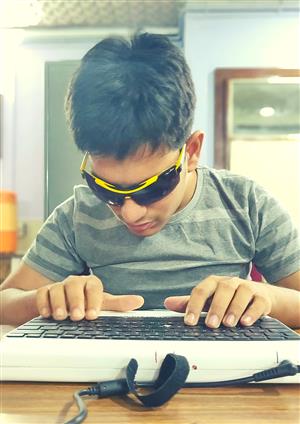
Accessible online library provided for free as a corporate social initiative
Sugamya Pustakalaya is an online accessible library for people with visual impairment or printing disabilities. It also supports libraries and publishers who wish to digitize their content into accessible formats. The library includes content in 17 languages and has 32,346 registered users in 2020.
Tata Consultancy Services, Sugamaya Pustakalaya (Online Accessible Library) by TCS Access Infinity, India -
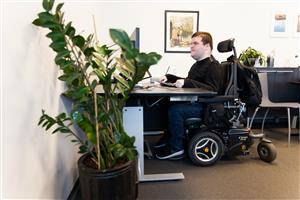
Collection of digital and technical solutions for universally designed workplaces
The Nordic Welfare Centre’s programme named Future of Working Life identifies and provides solutions in 18 technology areas that have the potential to improve the situation of people with disabilities in the labour market. The main target groups are employers, employees, and experts in the open labour market.
Nordic Welfare Centre, The Future of Working Life, Denmark -
Using iPads to create multiple information channels
The project developed interactive textbooks on vocational subjects designed to include students with learning disabilities, and that can be used on iPad. The subject matter is presented in multiple ways and offers a variety of learning styles. The project also offers customized tools to help students with dyslexia.
CLE - Leonardo Education Center, Italy -
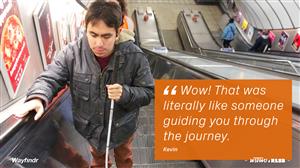
Wayfindr: Empowering vision impaired people to travel independently
Wayfindr wants to establish an Open Standard that helps manufacturers create consistent and reliable wayfinding products. For people with visual impairments, such a standard will enable them to navigate independently by giving them access to reliable, consistent directions from their smartphones and other devices.
Royal Society for Blind Children, United Kingdom -
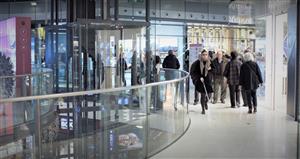
Accurate navigation system for the blind and visually impaired to improve public services
Waymap, an IT-start-up company from the United Kingdom, enables visually impaired people to orient themselves indoors and outdoors with a location accuracy of one meter. It is aimed at public transport operators, who offer the service free of charge to customers with disabilities.
Waymap, Waymap, United Kingdom -
Economic and social inclusion
The Unlocking Potentials programme contributes to improving the living conditions of persons with disabilities in Lebanon and supports them in accessing formal employment through vocational training. It provides comprehensive support for jobseekers, job opportunities in public and private sectors and a pilot scheme for income generation.
LPHU - Lebanese Physical Handicapped Union, Economic and social inclusion, Lebanon -
MOBILE, an all-round support program
MOBILE is a network of support and assistance for persons with disabilities living out of institutions, including parents. Costs for assisted living are in most cases covered by the regional authorities. In 2015 MOBILE supported 195 people, including 13 families with parents who had intellectual disabilities and their 25 children.
Mobile - Independent Living of Disabled People e.V., Germany -
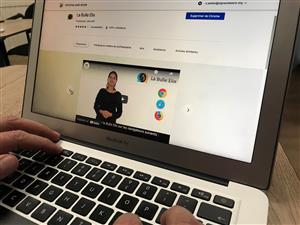
Web-browser extension for looking up explanations in sign language
Elix Dictionary was developed by the French NGO Signes de Sens. It is a bilingual video dictionary in French Sign Language. With free extension for web browsers, Elix Bubble users can access Elix Dictionary by right-clicking on a word without leaving the website.
Signes de sens, La Bulle Elix, France -
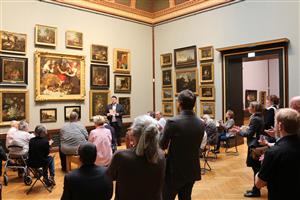
Training people with disabilities to be museum guides
Capito Mecklenburg-Vorpommern, together with the Staatliches Museum Schwerin, has developed a course that trains people with disabilities as art mediators. The course not only teaches art history, but also skills in dealing in dealing and communicating with different visitors or in handling difficult situations.
capito Mecklenburg-Vorpommern, New Ways to Art, Germany -
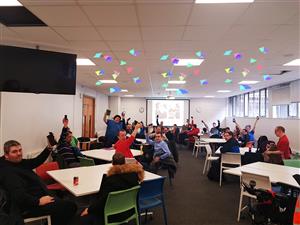
People with intellectual disabilities co-designing digital innovations
The co-design toolkit of Ireland’s Saint John of God Liffey Service (SJOG) enables people with intellectual disabilities to co-create mobile apps that support their daily lives. Launched in 2016, the co-design programme had 70 participants and more than 30 apps being developed by 2022.
Saint John of God Liffey Services, Co-Design Toolkit for Designing Inclusive Apps, Ireland
- Page 1
- Page 2
- Page 3
- Page 4
- Page 5
- Page 6
- Page 7
- Page 8
- Page 9
- Page 10
- Page 11
- Page 12
- Page 13
- Page 14
- Page 15
- Page 16
- Page 17
- Page 18
- Page 19
- Page 20
- Page 21
- Page 22
- Page 23
- Page 24
- Page 25
- Page 26
- Page 27
- Page 28
- Page 29
- Page 30
- Page 31
- Page 32
- Page 33
- Page 34
- Page 35
- Page 36
- Page 37
- Page 38
- Page 39
- Page 40
- Page 41
- Page 42
- Page 43
- Page 44
- Page 45
- Page 46
- Page 47
- Page 48
- Page 49
- Page 50
- Page 51
- Page 52
- Page 53
- Page 54
- Page 55
- Page 56
- Page 57
- Page 58
- Page 59
- Page 60
- Page 61
- Page 62
- Page 63
- Page 64
- Page 65
- Page 66
- Page 67
- Page 68
- Page 69
- Page 70
- Page 71
- Page 72
- Page 73
- Page 74
- Page 75
- Page 76
- Page 77
- Page 78
- Page 79
- Page 80
- Page 81
- Page 82
- Page 83
- Page 84
- Page 85
- Page 86
- Page 87
- Page 88
- Page 89